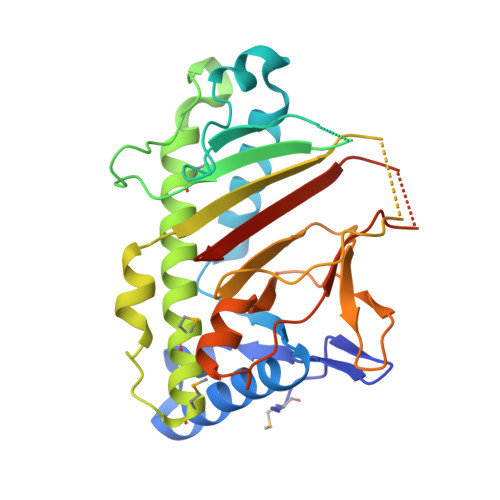Molecular basis for the substrate specificity and catalytic mechanism of thymine-7-hydroxylase in fungi
Li, W., Zhang, T., Ding, J.(2015) Nucleic Acids Res 43: 10026-10038
- PubMed: 26429971
- DOI: https://doi.org/10.1093/nar/gkv979
- Primary Citation of Related Structures:
5C3O, 5C3P, 5C3Q, 5C3R, 5C3S - PubMed Abstract:
TET proteins play a vital role in active DNA demethylation in mammals and thus have important functions in many essential cellular processes. The chemistry for the conversion of 5mC to 5hmC, 5fC and 5caC catalysed by TET proteins is similar to that of T to 5hmU, 5fU and 5caU catalysed by thymine-7-hydroxylase (T7H) in the nucleotide anabolism in fungi. Here, we report the crystal structures and biochemical properties of Neurospora crassa T7H. T7H can bind the substrates only in the presence of cosubstrate, and binding of different substrates does not induce notable conformational changes. T7H exhibits comparable binding affinity for T and 5hmU, but 3-fold lower affinity for 5fU. Residues Phe292, Tyr217 and Arg190 play critical roles in substrate binding and catalysis, and the interactions of the C5 modification group of substrates with the cosubstrate and enzyme contribute to the slightly varied binding affinity and activity towards different substrates. After the catalysis, the products are released and new cosubstrate and substrate are reloaded to conduct the next oxidation reaction. Our data reveal the molecular basis for substrate specificity and catalytic mechanism of T7H and provide new insights into the molecular mechanism of substrate recognition and catalysis of TET proteins.
Organizational Affiliation:
National Center for Protein Science Shanghai, State Key Laboratory of Molecular Biology, Institute of Biochemistry and Cell Biology, Shanghai Institutes for Biological Sciences, Chinese Academy of Sciences, 320 Yue-Yang Road, Shanghai 200031, China.

















